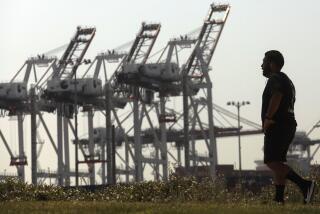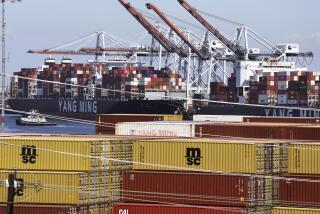As Mayorâs Trip Proceeds, Knowledge Increases
NAGOYA, Japan â Mayor Richard Riordan and his traveling delegation left Japan on Friday for the rest of Asia, taking with them a clearer vision of the critical but complex role that overseas deals will play in Los Angelesâ economic growth.
Over the past week, Japanese businessmen have approached mayoral aides to broach the idea of building a major Los Angeles hotel. U.S. Embassy officials and American executives in Japan have advised the delegates on strategies for penetrating the notoriously intricate Japanese economy. Executives with Los Angeles telecommunications companies probed the nuances of Japanese deregulation, discovering--among other things--that Americans and Japanese have vastly different notions of what that means. But they also found that there may be room for Los Angeles companies to profit by increased telecommunications business in Japan.
None of the executives participating in the mission have completed a deal. But Riordan aides and other delegates say that none were expected--at least not during the first leg of the two-week trip.
âOne has to be patient,â said Deputy Mayor Rockard Delgadillo, who handles economic development issues for Riordan. âBut weâre the powerhouse on our coast of the Pacific Rim, and theyâre the powerhouse on their side of the rim.â
Executives for small telecommunications firms--who, like the other business members of the delegation, are paying their own way--were particularly pleased that they had been able to use Riordan to open doors that otherwise would have been closed to them.
Jeff Lawrence, chief executive of the Los Angeles-based software company Trillium, called the visit âan excellent opportunity to build new relationships and strengthen existing relationships with Japanese telecommunications companies.â
In fact, Lawrenceâs presentation to Japanese executives in Tokyo was among the tripâs most successful, several delegation members agreed. At its conclusion, one Japanese businessman expressed interest in Trilliumâs software and bluntly asked how much it cost, a departure from customary Japanese decorum.
Still, every stop has carried its reminders of the painful economic crisis in Asia, where nations are reeling and companies wary of their futures. On one hand, the crisis has made deals more difficult to solidify because potential trading partners are reluctant to make commitments amid such uncertainty. At the same time, it made Japanese business leaders more interested in Riordan, whose background as a venture capitalist caught their attention even more than his position as mayor of Americaâs second-largest city.
During a meeting with members of Japanâs powerful business consortium known as the Keidanren, for instance, the mayor opened by asking whether Japanese executives were familiar with vulture funds, groups that buy troubled companies in return for banks forgiving a portion of the companiesâ debt.
At first, the executives were skeptical. âAmong Japanese financial institutions, there is no concept of forgiving halfâ of a companyâs debt, one executive said.
âSo they lose 100% of it,â Riordan responded.
The mayor pointedly noted that he had invested in such vulture funds, profiting handsomely in the process. The funds, he added, had helped clear the books of many failing American savings and loans, enriching some investors but also salvaging many jobs that otherwise would have been lost.
âThe motivation is to keep the business alive, even though they cannot perform on the loan,â Riordan said.
By the time he was through, the Japanese executives, who have a worldwide reputation for reticence, were lobbing question after question. A few related to the business of Los Angeles, but most were attempts to glean tips from a fellow businessman.
That same pattern held in Nagoya, where Riordan and part of the city delegation came to build on Los Angelesâ oldest sister city relationship. That required a series of protocol events--a visit to the mayor and city assembly, a courtesy call on port officials and a rollicking dinner with business and government leaders. It also provided another opportunity for Japanese businessmen to question Riordan on the economy.
About 300 executives turned out for Riordanâs lunchtime address. The mayor delivered a sober business address, blending a description of Los Angelesâ progress with his own theories on how best to manage organizations.
When he was through, the executives applauded loudly, then submitted questions in writing that asked his views on far-ranging topics, such as how to to build an airport and what he expected of Japan.
On the issue of Los Angelesâ expectations of Japan, Riordan responded by suggesting that Japan needed to open its markets and that Japanese executives and government officials âneed to have the courage to admit mistakes. For instance, to admit the mistake of having increased the value-added tax to too high a level.â
Afterward, several of the officials who attended the speech said Riordanâs economic advice was well received.
âWe need his ideas immediately and now,â said Takahiko Ito, a Japanese foreign ministry official. âThe mayor is very clear about his decisions and ideas.â
As the trip moves to China, the mayor is expected to play a more direct role in actual negotiations. In particular, port officials are hoping to persuade Cosco, a Chinese shipping firm, to bring its business to the Los Angeles port. That huge contract, which Port Director Larry Keller said could bring the city $20 million to $25 million a year in assessments on the companyâs cargo, is the subject of a fierce competition between Los Angeles and Long Beach.
Long Beach officials were in China earlier this month to plead their case for Coscoâs business, but Riordan and other delegation members hope that the mayor can personally extract a commitment from company officials next week.
âItâs a long shot,â Riordan said. âBut weâre going to take a hard shot at it.â
Two more potential port contracts will be discussed when the delegation gets to Taiwan, providing another opportunity for Riordan to conclude deals that could bring the city quick returns.
But here, as in Los Angeles, it is clear that although business occupies the mayorâs head, children and their education are the things that increasingly engage his heart.
On Thursday, Riordan and his wife, Nancy Daly Riordan, opened the day by touring the Daiichi kindergarten, a gleamingly clean school a few blocks from Nagoya City Hall. On arrival, about 30 uniformed children lined the walk and waved handmade flags at the mayor and his delegation. The children shouted âHello!â in English and smiled, as Riordan tried to shake their hands.
Throughout the rest of the day, Riordan brought up the trip to the school, remarking on the childrenâs spirit, the tidiness of their school and the commitment of their teachers.
âI could see that we have much to learn from the Japanese about how we educate our children,â Riordan said at his speech later that day. âWhen it comes to children, we must not tolerate mediocrity one second longer.â
More to Read
Get the L.A. Times Politics newsletter
Deeply reported insights into legislation, politics and policy from Sacramento, Washington and beyond. In your inbox three times per week.
You may occasionally receive promotional content from the Los Angeles Times.











